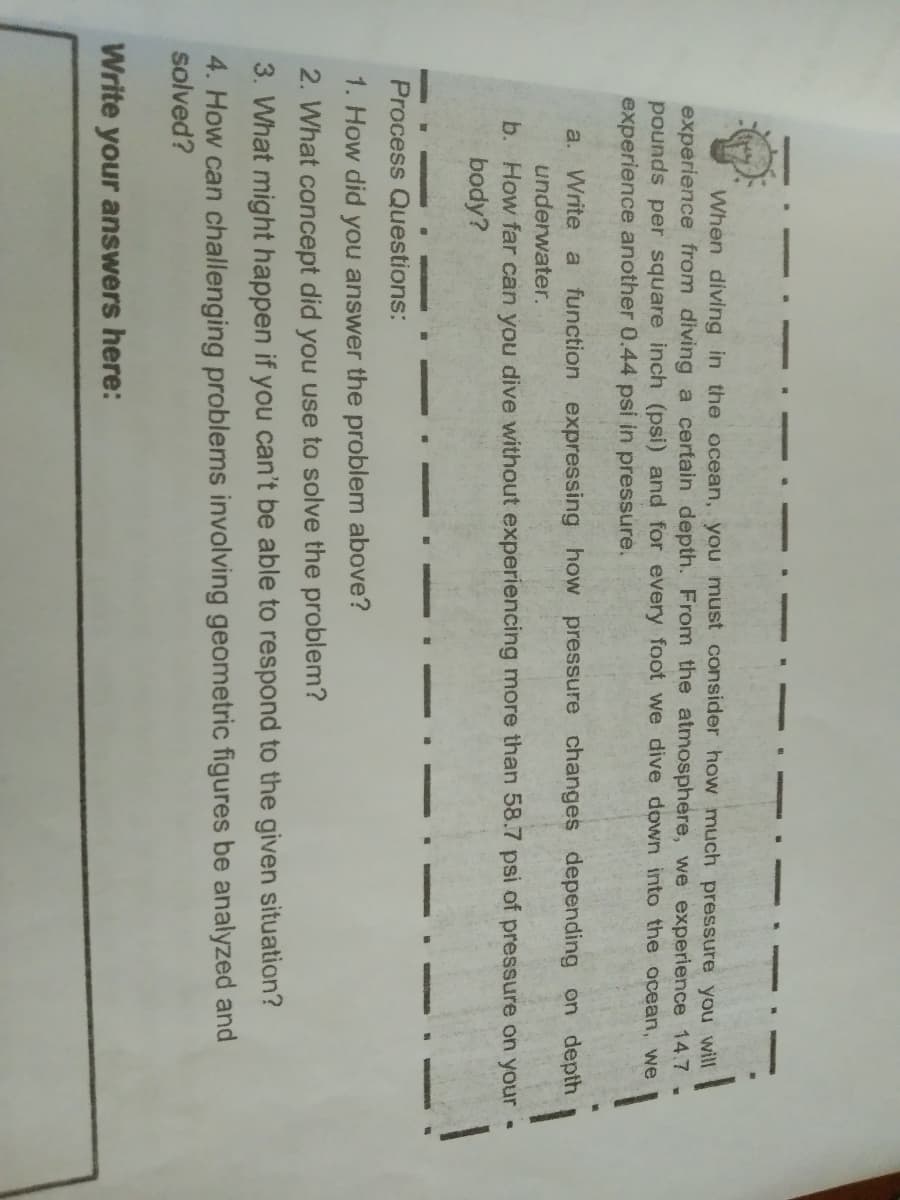When diving in the ocean, you must consider how much pressure you will experience from diving a certain depth. From the atmosphere, we experience 14.7 pounds per square inch (psi) and for every foot we dive down into the ocean, we experience another 0.44 psi in pressure. a. Write a function expressing how pressure changes depending on depth underwater. b. How far can you dive without experiencing more than 58.7 psi of pressure on your body? Process Questions: 1. How did you answer the problem above? 2. What concept did you use to solve the problem? 3. What might happen if you can't be able to respond to the given situation? 4. How can challenging problems involving geometric figures be analyzed and solved?
When diving in the ocean, you must consider how much pressure you will experience from diving a certain depth. From the atmosphere, we experience 14.7 pounds per square inch (psi) and for every foot we dive down into the ocean, we experience another 0.44 psi in pressure. a. Write a function expressing how pressure changes depending on depth underwater. b. How far can you dive without experiencing more than 58.7 psi of pressure on your body? Process Questions: 1. How did you answer the problem above? 2. What concept did you use to solve the problem? 3. What might happen if you can't be able to respond to the given situation? 4. How can challenging problems involving geometric figures be analyzed and solved?
Glencoe Algebra 1, Student Edition, 9780079039897, 0079039898, 2018
18th Edition
ISBN:9780079039897
Author:Carter
Publisher:Carter
Chapter8: Polynomials
Section8.1: Adding And Subtracting Polynomials
Problem 44PPS
Related questions
Question

Transcribed Image Text:When diving in the ocean, you must consider how much pressure you will
experience from diving a certain depth. From the atmosphere, we experience 14.7 .
pounds per square inch (psi) and for every foot we dive down into the ocean, we
experience another 0.44 psi in pressure.
a. Write a function expressing how pressure changes depending on depth
underwater.
b. How far can you dive without experiencing more than 58.7 psi of pressure on your
body?
Process Questions:
1. How did you answer the problem above?
2. What concept did you use to solve the problem?
3. What might happen if you can't be able to respond to the given situation?
4. How can challenging problems involving geometric figures be analyzed and
solved?
Write your answers here:
Expert Solution
This question has been solved!
Explore an expertly crafted, step-by-step solution for a thorough understanding of key concepts.
This is a popular solution!
Trending now
This is a popular solution!
Step by step
Solved in 4 steps with 2 images

Recommended textbooks for you

Glencoe Algebra 1, Student Edition, 9780079039897…
Algebra
ISBN:
9780079039897
Author:
Carter
Publisher:
McGraw Hill

Trigonometry (MindTap Course List)
Trigonometry
ISBN:
9781337278461
Author:
Ron Larson
Publisher:
Cengage Learning


Glencoe Algebra 1, Student Edition, 9780079039897…
Algebra
ISBN:
9780079039897
Author:
Carter
Publisher:
McGraw Hill

Trigonometry (MindTap Course List)
Trigonometry
ISBN:
9781337278461
Author:
Ron Larson
Publisher:
Cengage Learning


Functions and Change: A Modeling Approach to Coll…
Algebra
ISBN:
9781337111348
Author:
Bruce Crauder, Benny Evans, Alan Noell
Publisher:
Cengage Learning

College Algebra (MindTap Course List)
Algebra
ISBN:
9781305652231
Author:
R. David Gustafson, Jeff Hughes
Publisher:
Cengage Learning

Intermediate Algebra
Algebra
ISBN:
9781285195728
Author:
Jerome E. Kaufmann, Karen L. Schwitters
Publisher:
Cengage Learning